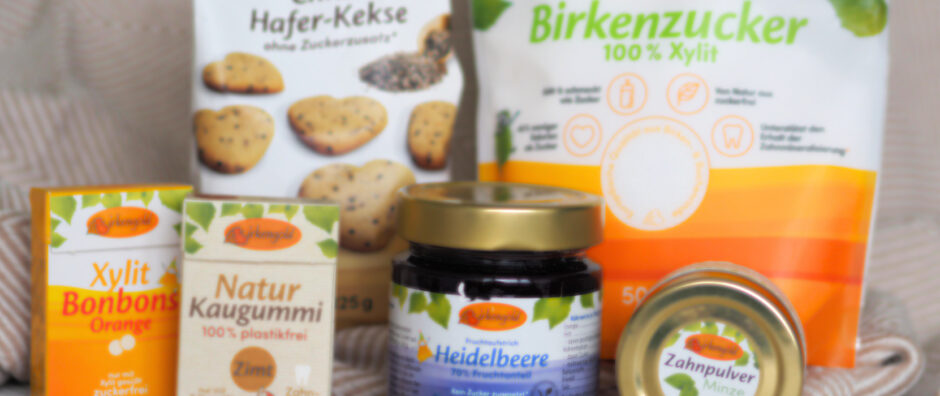Here we have compiled the answers to the most frequently asked questions for you. Should you have any further questions, please do not hesitate to contact us!
What are the disadvantages of Xylitol?
There are no known disadvantages. However, the following points should be noted:
Xylitol promotes digestion and can have a laxative effect when consumed in large amounts. The reason for this is that Xylitol is broken down into short-chain fatty acids. These act in the intestine in a similar way to fiber. They are partially broken down by bacteria, but mostly excreted undigested.
Most people tolerate (without habituation effect) about 0.6-0.8 g of Xylitol per kg of body weight per day. This is about 30-50 g of Xylitol for an adult, and of course correspondingly less for children.
If Xylitol is consumed regularly, the habituation effect usually sets in after a few days.
Is Xylitol suitable for diabetics?
Yes, Birkengold® Xylitol is suitable for both type 1 and type 2 diabetics.
- Birkengold® Xylitol has hardly any effect on the blood sugar level
- It is metabolized almost without insulin
- Glycaemic index of xylitol: 11 (compared to sugar: 70)
- Naturally sugar free
How is Xylitol / birch sugar extracted from birch bark?
The bark of the birch is a by-product of the wood processing process. Trees are never felled specifically for production. Birch bark contains a very high proportion of wood sugar (Xylose). The finely chopped rind is boiled, which dissolves the wood sugar of the rind. This is cleaned and separated from the other wood components. The Xylose is hydrogenated and Xylitol is formed.
Xylitol crystallizes on its own and can then be ground according to the desired degree of fineness.
Birch sugar has been used as a natural sweetener in Europe (especially Scandinavia) since World War II. Xylitol is also found in fruits and vegetables, e.g. in plums or mushrooms.
What is the difference between Xylitol from corn and Xylitol from birch bark?
Our conventional Birkengold® Xylitol is extracted from birch and beech bark from sustainable forestry. This product consists exclusively of Xylitol and is a purely European product. Of course, the production of Birkengold® xylitol is GMO-free at all stages.
We also offer Birkengold® organic Xylitol from organically grown corn on the cob. These are also 100% GMO-free and of high quality.
Dental care with Xylitol
For the dental care effect, it is best if you use Xylitol after brushing your teeth in the following ways:
Dissolve about a teaspoon of Birkengold® Xylitol in your mouth – the longer the Xylitol stays in the mouth, the better the effect. It should stay in the mouth for about 1 minute. Then spit out the Birkengold® Xylitol, or swallow it. It is not necessary to rinse with water.
Birkengold® Xylitol dissolves relatively quickly in the mouth because it promotes salivation. It is therefore not necessary to mix it with water. The Birkengold® Xylitol Sticks or our Xylitol Candies are very suitable for on the go. One stick contains just the right amount for dental care (about one teaspoon) as well as a few Xylitol candies, which consist of 90% pure xylitol.
Why is Xylitol good for teeth?
Xylitol has a positive effect on your dental health: Bacteria that cause tooth decay (especially Streptococcus mutans) cannot feed on Birkengold® Xylitol and are thus sustainably reduced.
Birkengold® Xylitol provides an alkaline environment in the mouth; Sugar, on the other hand, causes an acidic environment. The alkaline environment produced by Xylitol provides protection against tooth decay, tartar and plaque.
Xylitol effectively supports the remineralization of the teeth – even of already attacked tooth enamel.
Xylitol promotes saliva production, which gives a better rinsing function and neutralizes existing acids.
For these reasons, many dentists recommend Birkengold® Xylitol for dental care.
According to numerous studies, 3 x 5 g of Xylitol daily are already sufficient for this positive effect – even if sugar is consumed at the same time. 5 g of Birkengold® Xylitol corresponds to one heaped teaspoon.
CONCLUSION: Regular Xylitol application prevents the development of tooth decay and can stop and remineralize carious lesions that have already begun.
Can children eat Xylitol?
On the subject of children and Xylitol, the following is recommended:
We would generally avoid sweeteners in children in the first year of life, including sugar and honey. However, it is of great benefit to the children’s dental health if Birkengold® Xylitol is used by the parents. This is because babies do not have caries bacteria in their mouths, which are only transmitted by their parents. Studies have shown that the risk of tooth decay for children can be significantly reduced if parents use Xylitol.
From the age of one, children can tolerate Birkengold® Xylitol well. However, the introduction of Birkengold® Xylitol should be started slowly so that digestion can adjust to it. Since Birkengold® Xylitol promotes digestion, it can have a laxative effect on sensitive people.
